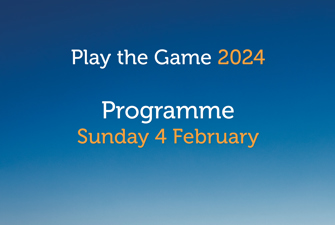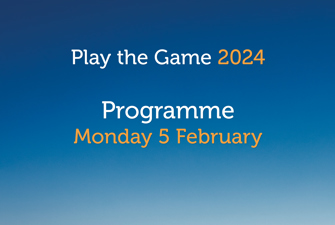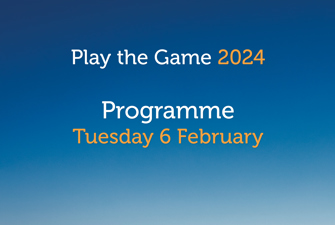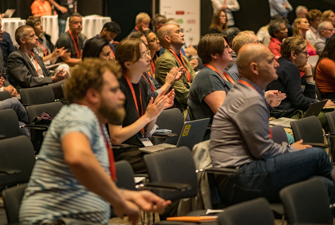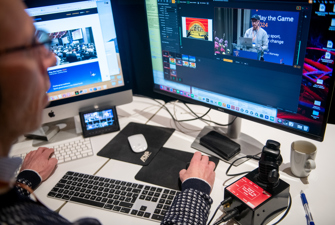09:00: Main session
In the aftermath of abuse: Where can athletes find remedy?
Room: Olav Tryggvason
Chair: Julie Ann Rivers-Cochran
- Building evidence to strengthen safeguarding in international sport
Tine Vertommen, researcher, Thomas More University/IOC, Belgium - Finding voice after decades of trained silence
Kim Shore, independent safe sport advocate, Canada - Key learnings of FIFPRO in supporting players in abuse cases
Alexandra Gómez Bruinewoud, senior legal counsel, FIFPRO, Uruguay - Sins of the Father: Challenging sport institutes through First Nation truth telling
Laura Robinson, freelance journalist,Canada - Remedy as a process: Co creating solutions with people impacted by abuse in sports
Joanna Maranhão, network coordinator, Sport & Rights Alliance, Brazil - Remedies for wrongdoing: options and alternatives
Ingrid Beutler, founder, Beutler International Sports Advisory, Switzerland - Panel debate, Q&A
09:00: Main session
Anti-doping and human rights: Are they compatible?
Room: Tavern
Chair: Kim Højgaard Ravn
- Human Rights – a corner stone for the credibility of Anti-Doping
Anders Solheim, CEO, Anti-Doping Norway, Norway - ‘Closing the Gap’: Player union perspectives on aligning anti-doping rules with international human rights standards
Ginous Alford, director of Sport and Human Rights, World Players Associations, Switzerland - Failures in the Global Anti-Doping System: Harms Caused by Ineffective Protection of Athletes’ Rights
Travis T. Tygart, CEO, USADA, United States - Proactive reporting and human rights in anti-doping – an I&I perspective
Nicholas Raudenski, head of intelligence & investigations, International Testing Agency, Switzerland - An efficient antidoping policy based on a new set of rules
Wladimir Andreff, honorary professor, Ministry for sports & University Paris 1, France - Who is there to assure Athletes’ Rights? - the Ombuds Perspective
Anna Thorstenson, Ombuds, Athletes’ Anti-Doping Ombuds (WADA), Switzerland - Panel debate, Q&A
11.00: Coffee break
Documentary: Gamblers Like Me: The Dark Side of Sports Betting
11.45
Room: Olav Tryggvason
Chair: Philippe Auclair
Join us for the gripping documentary, 'Gamblers Like Me: The Dark Side of Sports Betting', shot, produced, and directed by Zoe Flood for BBC Africa Eye. The documentary delves into how sports betting has exploded across Africa, and follows one young football fan on a journey across Uganda, to find out what happens when global companies target some of the poorest and most vulnerable people on the
continent.
- Introduction of 'Gamblers Like Me: The Dark Side of Sports Betting'
Zoe Flood, journalist and filmmaker, United Kingdom - Q&A with Zoe Flood led by Philippe Auclair
Integrity worldwide: Comparative perspectives and special challenges
11.45
Room: Tavern
Chair: Alex Phillips
- Beating the odds against sports competition manipulation: A critical analysis on information sharing platforms and data
regulation of the European Union
Simon Taes, assistant professor, KU Leuven ‐ Institute for Labour Law, Belgium - Clearing sport in Africa: Special challenges, global relevance
Eze Alloysius, executive director, PLAYYA Nigeria, Nigeria - Initiating and shaping an independent Center for Safe Sport in Germany
Tarek Elias, policy and public affairs officer, Athleten Deutschland e.V., Germany - Urgent call for an independent global watchdog to safeguard sports integrity
Fréderique Reynertz, managing director, FRConsulting, Monaco - ClearingSport roundtable on obstacles to international cooperation
- Panel debate, Q&A
No pain, just gain: The future of anti‐doping testing
11.45
Room: Sverreborg
Chair: Rasmus K. Storm
- No pain, just gain: Further development of anti‐doping testing to be better prepared for the future
Sara Amalie Solheim, postdoctoral fellow, Norwegian Doping Control Laboratory and Norwegian School of Sport Sciences, Norway - The future of doping testing? How anti‐doping organizations perceive the implementation of a remote sampling system in anti‐doping work
Benedikt Stoffers, research assistant, University of Münster, Germany - Time will tell? Exploring the C‐Level ADO perspective on anti‐doping sample retention and further analysis application in anti‐doping testing
Julian Lanfer, PhD student, University of Münster, Germany - Panel debate, Q&A
Global spotlight on Qatar: A media perspective
11.45
Room: Austrått
Chair: Håvard Melnæs
- Qatar 2022: A British media perspective
Owen Evans, senior lecturer, University of Brighton, England - Global spotlight on Qatar: The narrative of the men's 2022 World Cup
Jakob Werner Jeppesen, student, Copenhagen Business School, Denmark - Presentation title to be confirmed
Stephen Cockburn, head of Economic and Social Justice, Amnesty International, UK - Panellist: James M. Dorsey, academic, journalist, syndicated columnist, blogger, S. Rajaratnam School of International Studies and The Turbulent World with James M. Dorsey Singapore / Germany / Morocco
- Panel debate, Q&A
Play the Game: Where do we want to be in 2030?
11.45
Room: Brattøra
Chair: Christian Le Coq
Session organised by Play the Game's analyst Christian Le Coq and managing director Troels Rasmussen. What directions should Play the Game look towards in the future? Please join us for a workshop about what Play the Game should offer, and help us with your ideas, opinions, and feedback.
13.00: Lunch
Who is sportswashing whom?
14.00
Room: Olav Tryggvason
Chair: Sven Daniel Wolfe
- Sport and militarism: The forgotten nexus
Ian Mengel, board member, PLAY!YA, Germany - Does sportswashing erode democracy?
Nicholas McGeehan, co‐director, FairSquare, France - Saudis power play transcends sportswashing
Karim Zidan, journalist/Sports & Dictators Fellow, Sports Politika/Human Rights Foundation, Canada - Sport as a tool to push the balance of power between Saudi Arabia's multiple identities
Thilde Asmussen, freelance journalist, Denmark - Does Mohammed bin Salman care about accusations of sportswashing?
Frank Conde Tangberg, policy advisor, Amnesty International Norway, Norway - Sports mega‐events and their political memory: Political significances of France 2016, Russia 2018, and Pan‐European 2020 football championships as recalled by Icelanders
Vitaly Kazakov, Rannís postdoctoral fellow, University of Iceland, Canada - Panel debate, Q&A
Rights and representation: What is an athlete worth?
14.00
Room: Tavern
Chair: Lorenz Fiege
- Swimming lessons: A deep dive into the brief life of the international swimmers alliance
Michael Gibbons, attorney, MPG Law, United States - Is it time for an international athletes' bill of rights?
Kimberly Holst, PhD student, Arizona State University, USA - Legal table tennis ‐ Who is legally responsible for athletes welfare?
Csilla Szomolaiová, PhD student, Masaryk University, Faculty of Law, Czech Republic - Mapping athlete representation democratic deliberative spaces in transnational sport governance
Lisa A. Kihl, professor, University of Minnesota, USA - Regional sports democracy ‐ who participates and what factors impact interest in regional decision‐making arenas for sports
policy?
Anne Tjønndal, professor, Nord University, Norway - Consent to violence in ice hockey: How do we account for changes in player's attitudes over time?
Victoria Silverwood,lecturer in criminology, Swansea University, United Kingdom - Panel debate, Q&A
Safeguarding athletes or protecting the brand?
14.00
Room: Munkholmen/Kristiansten
Chair: Laura Robinson
- Inappropriate behavior in Finnish sports: Uncovering cultural and structural challenges
Marko Kananen, research manager, Finnish Center for Integrity in Sports (FINCIS), Finland - Distrust unveiled: Global athlete perspectives on reporting mechanisms
Whitney Bragagnolo, PhD researcher, MAiSI Alumni | Charles University, Netherlands - Finding a way forward: Addressing organizational factors contributing to systemic maltreatment in the sport system
Marcus Mazzucco, adjunct lecturer, University of Toronto, Canada - Creating a framework for safeguarding at major sporting events
Claudia Villa, independent safeguarding specialist, CV Consultancy/Centre for Sport & Human Rights, United Kingdom - Football's Broken Hearts: How Data Reveals Excess Cardiac Death Amongst Football Professionals
Gerke Berenschot, researcher and journalist, The System Behind the Incident, Netherlands - Safe sport: Failing athletes, protecting the brand
Rob Koehler, director general, Global Athlete, Canada - Panel debate, Q&A
The Russian‐international doping scandal: Lessons and legacy
14.00
Room: Sverreborg
Chair: Andy Brown
- State‐sponsored doping and international state responsibility: Lessons from the Russian doping case
Faraz Shahlaei, adjunct professor, Loyola Law School, United States - Russian perspectives on the Russian doping scandal, and countermeasures against
Aya Sadamasu, football physician, researcher, Chiba University, Japan - States and doping: Towards an extended responsibility?
David Pavot, professor of sports law, Université de Sherbrooke, Canada - The Rodchenkov Anti‐Doping Act: The United States’ newest approach to doping control
Genevieve Birren, professor, SUNY Cortland, United States - Panel debate, Q&A
Opening doors for everyone in sport
14.00
Room: Austrått
Chair: Andy Harvey
- The perspective of current and retired world class, elite and national athletes on the inclusion and eligibility of transgender
athletes in elite sport
Alexandra Shaw, PhD student, Swansea University, United Kingdom - Who owns the truth about sport? Hegemonic reflexes in the gender debate
Sandra Meeuwsen, director ESPRIT, Erasmus University Rotterdam, Netherlands - What is unfair advantage?
Åsa Ekvall, gender expert, Erasmus University Rotterdam, Netherlands - From a culture of silence to a culture of resistance: Reflections on fifteen years of advocating for the rights of athletes with innate variations of sex characteristics
Payoshni Mitra, executive director, Humans of Sport, UK/India - Together but not scrambled? Ethnic discrimination and a low‐cost intervention
Cornel Nesseler, associate professor, University of Stavanger, Norway - Football is supposed to be for everyone: Some solutions for the barriers and challenges facing minority ethnic women soccer fans
Katie Taylor, senior lecturer in sociology of sport, Nottingham Trent University, United Kingdom - Panel debate, Q&A
Fans or foes: The spirit of sport journalism
14.00
Room: Brattøra
Chair: Håvard Melnæs
- How fandom, union sentiment, and game knowledge influence U.S. sports journalism students’ sympathies during MLB labor dispute
Sada Reed, assistant professor, Arizona State University, USA - Sports journalism in Romania: Football, an exclusive advertising channel
Florian Petrica, university lecturer, Faculty of Journalism and Communication, University of Bucharest, Romania - Getting to the why: Educating the next generation of sports journalists and communicators on anti‐dopings purpose
Brad Horn, professor of practice/associate dean, Syracuse University, United States - Going Backwards: The Declining State of American Investigative Sports Journalism and What Can Be Done About It
Josh Fine, investigative reporter, United States - OSINT tools and techniques to verify and conduct sport investigations
Federico Dario Teijeiro, investigative and data journalist, Universidad de San Andrés y Clarín, Argentina - Panel debate, Q&A
15.30: Coffee break
16.00: Plenary session
Paris 2024 and future Olympics: Beacons of peace or tokens of war?
Room: Olav Tryggvason
Chair: Nick Harris
- The value of unified sport and peaceful competition in a world with conflicts and division
Kristin Kloster, member of the Executive Board, IOC, Norway - Not all bridges built for a peace
Vladyslav Heraskevych, M.Sc., Olympian/Ukranian athlete, NOC of Ukraine, Ukraine - Neutral athletes: Pigeons of war or hawks of peace?
Anatol Kotau, director of external relations, Belarusian Sport Solidarity Foundation, Estonia - Prioritizing Responsibility: Advocating for political leadership
Hans Natorp, president, National Olympic Committee and Sports Confederation of Denmark, Denmark - Sport between nationalism and patriotism
Jérôme Champagne, former FIFA deputy general secretary, Sportlyanz, France/Switzerland - Panel debate, Q&A
18.00
Closing remarks by Jens Sejer Andersen
Room: Olav Tryggvason
19.30: Cocktails
20.00: Farewell party with dinner & Play the Game Award 2024
